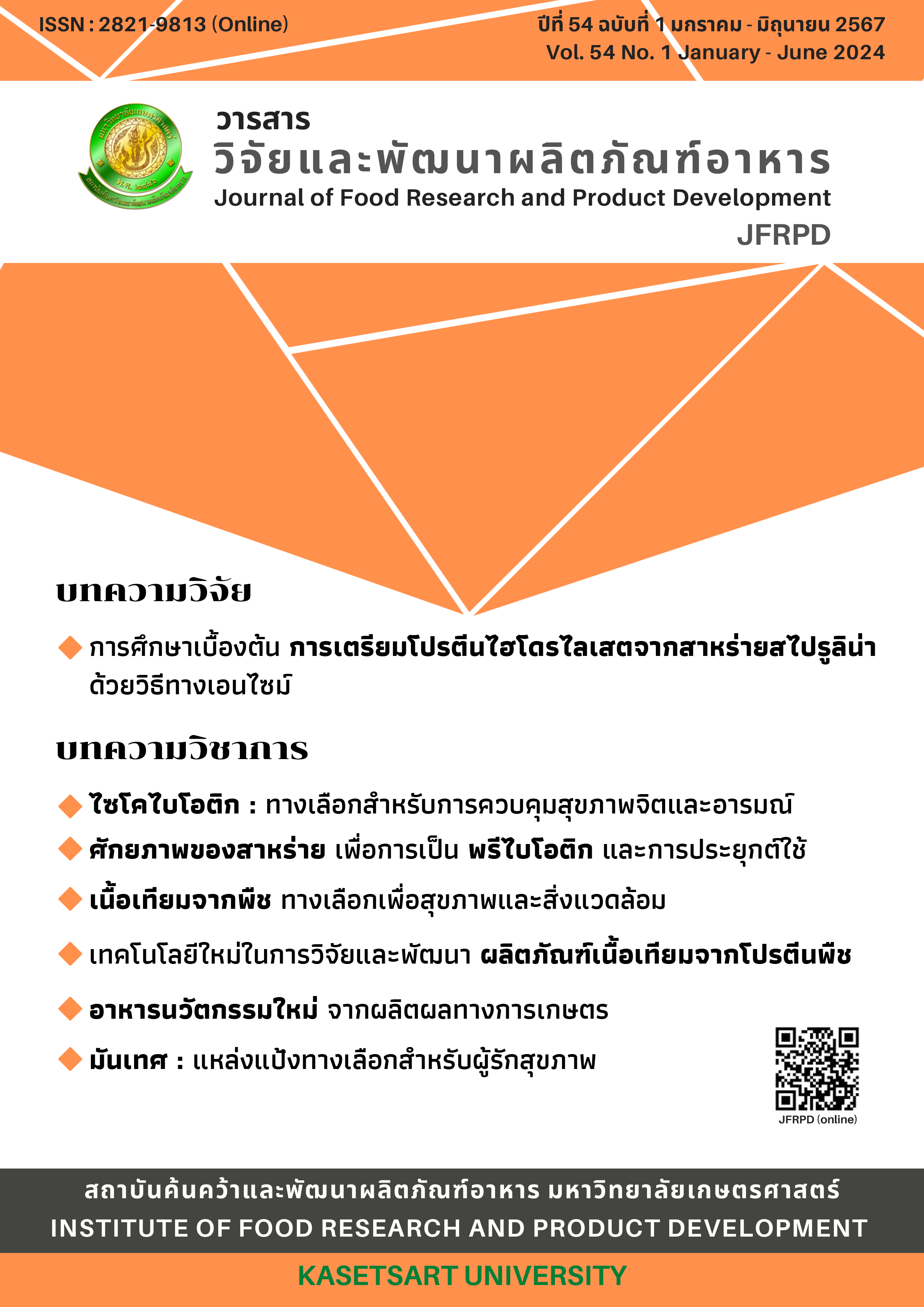Psychobiotics : alternative approach for controlling mental health and mood
Main Article Content
Abstract
Psychobiotics refer to gut microbes producing neurotransmitters between microbiota-gut-brain axis to central nervous system (CNS) which plays a key role in positive effects on mood, and anxiety and cognition. Change in gut symbiosis reflects the brain and mental health. Consumption of psychobiotics through probiotic supplements or foods (e.g. Bifidobacteria and Lactobacilli) results in change in neurotransmitters in the brain. Psychobiotics potentially improve mental health; therefore, supplementing with a probiotic may be worth considering as one part of a comprehensive mental health treatment plan for depression, stress reduction, anxiety reduction and good sleep. The efficiency of signaling on mental health from psychobiotics is strain-dependent whether single strain or mixed strain is used. Also, these results depend on personal response, which differ in the link between their gut microbiome and health.
Downloads
Article Details

This work is licensed under a Creative Commons Attribution-NonCommercial-NoDerivatives 4.0 International License.
References
Oroojzadeh P, Bostanabad SY, Lotfi H. Psychobiotics: the influence of gut microbiota on the gut-brain axis in neurological disorders. J Molecular Neurosci. 2022;72(9):1952–64.
Naidoo U. This is your brain on food: an indispensable guide to the surprising foods that fight depression, anxiety, PTSD, OCD, ADHD, and more (an indispensible anxiety, PTSD, OCD, ADHD, and more). Little, Brown Spark; 2020.
Dinan TG, Stanton C, Cryan JF. Psychobiotics: a novel class of psychotropic. Biological Psychiatry. 2013;74: 720-6.
Evrensel A, Ünsalver BÖ, Ceylan ME Psychobiotics. In: Frontiers in psychiatry. Springer; 2019. p565-81.
หนังสือพิมพ์ประชาชาติ. ทำความรู้จัก “ไซโคไบโอติกส์” (Psychobiotics) ผู้กำกับ อารมณ์ และ สุขภาพจิต เพื่อหลีกเลี่ยงสภาวะซึมเศร้า (วันที่ 14 กันยายน 2565) เข้าถึงได้จาก https://www.prachachat.net/public-relations/news-1048622
Parracho HMRT, Bingham MO, Gibson GR, McCartney AL. Differences between the gut microflora of children with autistic spectrum disorders and that of healthy children. J Med Microbiol. 2005; 54:987-91.
Bercik P, Collins SM, Verdu EF. Microbes and the gut-brain axis. Neurogastroenterol Motil. 2012; 24:405-413
Zmora N, Soffer E, Elinav E. Transforming medicine with the microbiome. Sci Transl Med. 2019; 11(477):eaaw1815.
Sarkar A, Lehto SM, Harty S, Dinan TG, Cryan JF, Burnet PWJ. Psychobiotics and the manipulation of bacteria–gut–brain signals. Trends Neurosci. 2016; 39(11):763-81.
Sengun IY, Kirmizigul A. 2020. Probiotic potential of kombucha. J Funct Foods. 2020; 104284.
Radavelli-Bagatini S, Sim M, Blekkenhorst LC, Bondonno NP, Bondonno CP, Woodman R, et al. Associations of specific types of fruit and vegetables with perceived stress in adults: The ausdiab study. Eur J Nutr. 2022;61(6):2929–38.
Pickering G, Mazur A, Trousselard M, Bienkowski P, Yaltsewa N, Amessou M, et al. Magnesium status and stress: the vicious circle concept revisited. Nutr. 2020;12(12):3672.
Al Sunni A, Latif R. Effects of chocolate intake on perceived stress; a controlled clinical study. Int J Health Sci (Qassim). 2014;8(4):393-401.
Majeed M, Nagabhushanam K, Arumugam S, Majeed S, Ali F. Bacillus coagulans MTCC 5856 for the management of major depression with irritable bowel syndrome: a randomized, double-blind, placebo controlled, multi-centre, pilot clinical study. Food Nutr Res. 2018;62(0).
ResearchAndMarkets.com The "psychobiotics market by psychotropic agent, by form, by application, and by region - global forecast to 2023-2033" offering. (Oct. 11, 2023)

